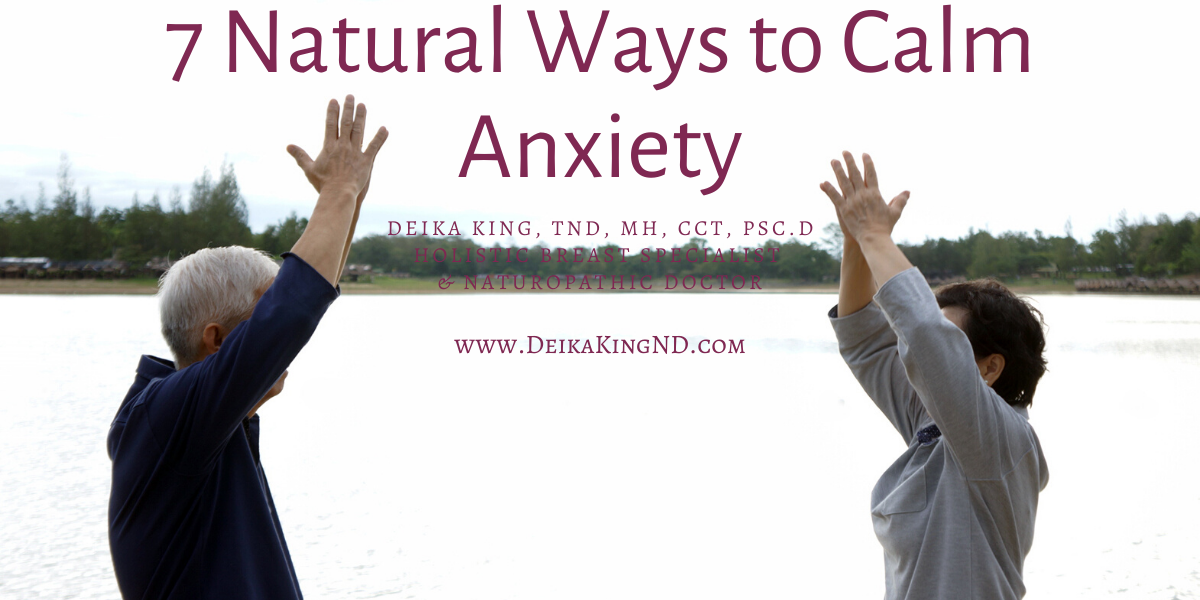Anxiety is a natural part of life. So natural that every person has suffered from some form of anxiety in his or her lives. There are people with sporadic episodes of anxiety and people who have anxiety on most days of their life. While there are medications that can curb anxiety, most are highly addictive and your body comes to depend on them.
Most people don’t need medications but can effectively manage their anxiety with all-natural techniques. And using common-sense approaches of controlling the symptoms of irritability, nervousness, lack of concentration and fear should be used. It is always important to follow your doctor’s advice when it comes to dealing with any type of anxiety conditions.
Anxiety can often be debilitating and can really interfere with one’s quality of life. It can cause nervousness that can affect your enjoyment of life and family, as well as your performance at work. When dealing with anxiety, it’s important to pinpoint the source and if possible eliminate them. For some, the sources are not so easily detected.
Seeking out natural methods to lower your anxiety level is important and there are many ways to do so. The most important thing is to take the time to care for yourself and to implement them in your life.
The following are seven great ways you can curb anxiety in your life, safely and naturally. You can call upon these ways of controlling anxiety whether it is a sporadic or chronic part of your life:
-
Get plenty of sleep –
A good night’s sleep can restore your energy and can reset your anxiety level so it is manageable. A few people will wake up anxious from a disturbing dream. Others may have trouble finding ways to discharge the anxious energy from the day before. Some are prone to having an anxiety-producing event the moment they wake. So, it’s important to manage sleep appropriately to improve the outcomes for the day ahead.
-
Practice daily meditation –
Meditation is the art of using your breath and your mind toward relaxing your body. It is also a great way to release nervous energy whenever you want. In the beginning, you will want to find a quiet place to sit or lie down. Close your eyes and focus on the natural in and out of your breath. Vocalize a soft mantra, which can be a syllable, a word, or a phrase like, “relax,” “ohm” or something similar. Breathe to gradually relax all the muscles of the body, especially those muscles that are tense from chronic anxiety. Remain focused on your breath, allowing the release of negative, anxious energy from your body. When you are fully relaxed, stay in that state for a few more minutes so you can feel the relaxation happen. Practicing mediation on a daily basis can go a long way to lowering anxiety.
-
Tai Chi –
This is a popular form of relaxation and body strengthening technique for relieving anxiety in Asian countries like China. It involves standing and moving through different poses that you focus intensely on. It looks a lot like a dance that involves your breath and your muscles, which flow from one pose to another in a natural way. There are Tai chi DVDs to help you get started and many health clubs offer classes to show you how to do it.
-
Yoga –
Yoga is a practice that originated in the Far East but has spread to be commonly used throughout the world with millions who practice it on a regular basis. In fact, yoga has more than 50 different health benefits, one of which is the ability to elicit the relaxation response in the body and subsequently lower anxiety. There are many types of yoga. Some are more relaxing, while others are more energizing. The types of yoga you want to practice for anxiety relief include the popular Hatha yoga, which guides you through different poses in a smooth and natural way. Hatha yoga uses breath work that controls the speed and length of time spent in poses, and is essential in helping to reduce both stress and anxiety.
-
Mindfulness –
This is the art of focusing on the here and now, going about your life with your focus being in the present and ordinary aspects of human living. When you do things mindfully, you engage your senses so that you fully engulf yourself in present time and spend less time worrying about the future or upcoming anxiety-producing events. Learning to live “in the moment” is an art that takes practice, but is well worth the effort because it is very effective and beneficial in reducing both stress and anxiety.
-
Visualization –
This type of meditation allows your mind to go somewhere else and away from an anxiety-provoking situation. In visualization, you spend time mentally traveling to a special, calm place so you can imagine yourself on a great mountain, a sandy beach or in the ocean itself. After several minutes in your imagined place of serenity and comfort, you will come out of your trance feeling better and calmer. With practice, the ability to visualize can become second nature, and like breathing can go a long way to reducing anxiety, even on a minute-by-minute basis.
-
Regular Exercise –
Simple aerobic exercise, such as cycling, running, walking or swimming will get your heart rate going, releasing nervous energy as you exercise. You may finish with a sense of fatigue plus an “exercise euphoria” that will eliminate anxious thoughts.
I hope these suggestions are helpful to you in your pursuit to wellness and peace of mind.
Deika King, TND, MH, CCT, PSc.D
Traditional Doctor of Naturopathy







